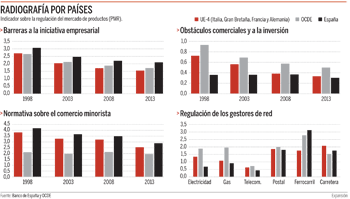
Spain must eliminate legal barriers to business creation
Although regulatory obstacles have been reduced, the Bank of Spain insists in a report on the need to overcome obstacles such as the licensing system or the professional services standard.
Entrepreneurship continues to encounter some legal barriers in Spain, where the degree of regulatory complexity has remained above the main European economies (France, Italy, Germany and Great Britain) and the OECD average in the last 15 years.
This is stated in a recent report from the Bank of Spain in which this situation is attributed to "a more costly system of licenses and authorizations, in which there have been no improvements since 2003."
Under the title Regulation in the product market in Spain according to OECD data, the report maintains that, although the Umbrella Law of 2009 introduced single windows to make it easier for companies to comply with the legislation by electronic means in their contact with the Administration, their use has not become widespread.
In this sense, the Bank of Spain highlights that, unlike what happens in other countries, "these institutions are merely informative and do not allow the approval of all the documents required to open a company, nor are these steps always accessible via Internet".
However, the agency does recognize progress in the simplification of administrative procedures and in the accessibility of information on the applicable regulation, which includes aspects such as the existence of an official count of the number of permits, authorizations and licenses required and the establishment implementation of plans to reduce administrative burdens.
Furthermore, the report contemplates improvements in Spain in the procedures for the creation of limited companies, reaching levels similar to those of other European countries, although it continues to detect greater difficulties for small companies to establish themselves as self-employed and to start an activity related to the service sector.
Regarding legal barriers to the entry of foreign direct investment, the data show a good situation in Spain, compared to other countries.
Retail commerceThe Bank of Spain report, prepared by Juan S. Mora-Sanguinetti and María Martínez Matute, both belonging to the General Directorate of the entity's Research Service, includes the impact of regulation in various sectors of the economy and highlights that, as a whole, our country "still continues to show a more restrictive regulatory framework than that of the main European countries."
This is the case, for example, with retail trade, an area that has a particularly high regulatory level in Spain, despite the improvements in recent years. According to the report, the bad data is due, above all, to a high regulation of the opening hours of establishments in relation to other European countries.
Among the improvements, the liberalization of sales periods stands out, as well as the permits necessary to open a business and the particular regulation of department stores. However, the authors of the study point out that the OECD indicators on which the report is based only collect national regulations, something that must be taken into account in this area of retail trade, where the autonomous communities have very high regulatory powers. spacious.State controlAmong the positive aspects, the study reveals that Spain shows a lower degree of general state control over economic activities compared to both OECD countries and the four main EU economies.
According to him, this is mainly due to less direct control of the State over private companies in different sectors of the economy.
The only aspect in which Spain shows a worse performance compared to other European countries is in the number of sectors in which the Public Administrations control at least one company.
In the network sectors (energy, transport and telecommunications), Spain has significantly decreased the level of regulation in the last 15 years and, especially between 1998 and 2003, except in transport, especially railways.
In this last sector, regulation in 2013 still remained at levels higher than that of European countries and the OECD average.
Barriers in professional servicesAlthough the regulation of professional services in Spain is more restrictive than in the rest of the OECD countries and in the four main EU economies, the report recognizes progress thanks to the Omnibus Law.
In this area, the indicators evaluate regulations on professions related to auditing and accounting, legal activities, architecture and engineering.
It highlights that some restrictions have been reduced on the advertising of this type of services and the joint exercise of two or more professions, and the power of the associations to establish indicative scales of fees has been eliminated.
Regarding visas, the Government approved a Royal Decree in 2010 that reduced the mandatory ones to nine. In any case, the Bank of Spain clarifies that the differences with other countries have more to do with access to the profession than with barriers to practice, which "is mainly due to greater training requirements in our country to practice." the different activities.
Currently, the announced law on professional services and associations is still pending approval.
www.expansion.com



